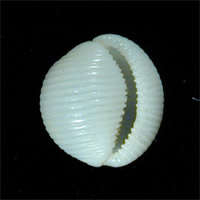|
< Previous family introduction |
|
|||||
 |
Family
Triviidae
Bean cowries |
|||||
|
The Triviidae consists of two subfamilies of small shells which are fairly distinct in shell form but closely related in anatomy. Shells of the subfamily Triviinae are cowry-like in shape, but are sculptured with strong ribs across the whole shell surface. In the subfamily Eratoinae shells are high spired and smooth with only the outer lip expanded and toothed. Most are uniformly white or pink, with a few having brown bands or spots. In both subfamilies the shell surface is kept glossy by flaps of the mantle which extend over the shell surface, as in the cowries. European triviids are known to live in association with colonial tunicates, on which they feed and lay their eggs, but little is known about the biology of the Australian species. Family References:
Identification Notes: One of the most useful characters in identification of triviines is the sculpture at the centre of the dorsal surface of the shell. The ribs may be continuous across the dorsum, or leave a space in the centre, which may be smooth or grooved to a greater or lesser extent. The number of ribs, most easily counted on the outer lip, is another important character. Coverage All species known from NSW are covered here. |